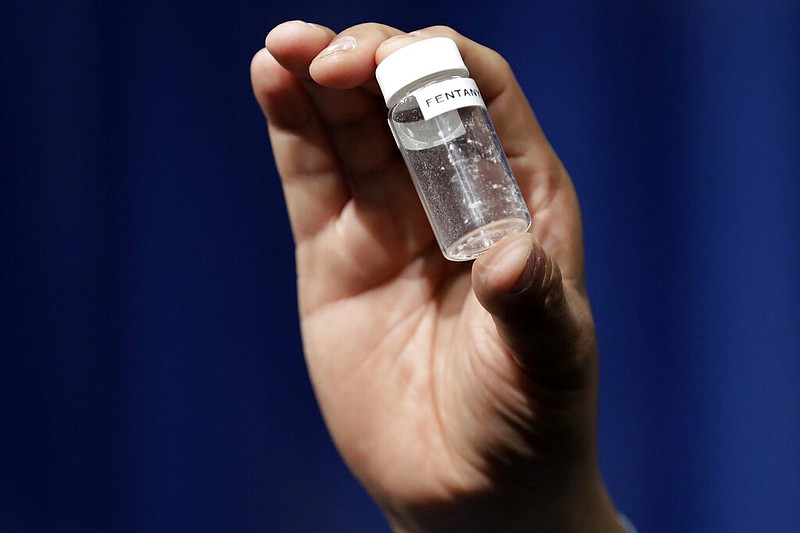A Little Rock man who pleaded guilty to distribution of 157 grams of fentanyl last August was sentenced Friday to 19 years and 2 months in federal prison.
Josh Wiley, 30, was named in a superseding indictment in September 2020, charged with conspiracy to distribute fentanyl and cocaine and two counts of distribution of fentanyl. Wiley pleaded guilty to one count of distribution of fentanyl before U.S. District Judge James M. Moody Jr. last August in exchange for the dismissal of the remaining counts against him. Four others were also named in the indictment: three on cocaine conspiracy and distribution counts and one on conspiracy to distribute cocaine and fentanyl, cocaine distribution and weapons charges.
According to his plea agreement, on Aug. 29, 2019, agents with the Drug Enforcement Administration in Little Rock arranged for a confidential source to purchase heroin from Wiley for $4,000. According to the plea agreement, Wiley met the confidential source at a location on Stagecoach Road in southwest Little Rock to make the sale. When the drugs were examined at the DEA crime lab, the plea agreement said, it was discovered that Wiley had sold the confidential source 60 grams of fentanyl.
Between May 31 and Aug. 29, 2019, the plea agreement said, the DEA purchased 157 grams of fentanyl from Wiley.
Wiley’s attorney, Theodis Thompson of Little Rock, asked Moody to consider a downward departure of Wiley’s guideline sentencing range of 188 months to 235 months in prison.
“Mr. Wiley has two prior convictions that make him a career offender,” Thompson said. “One of those was for possession of marijuana with intent to distribute when Mr. Wiley was 18 years of age, and that was over 12 years ago … It’s not Mr. Wiley’s intent to make light of this prior conviction, however, today marijuana is widely used and accepted.” Thompson pointed out that two of Wiley’s co-defendants had been sentenced to far lower prison terms.
Phillip Smith, the lead defendant, was sentenced to 10 years for cocaine distribution and a firearms charge. Terrance Spreads received a 51-month sentence for cocaine distribution. A third defendant, Lonnie Smith, pleaded guilty to cocaine distribution but has not yet been sentenced. A fourth defendant, Kawanis Redmon, died in November.
Thompson said Wiley had a harsh upbringing, pointing out in a sentencing memorandum that Wiley’s brother was shot to death in 2008 and his father died in 2014.
Wiley, speaking hesitantly, apologized to Moody for his actions, telling the judge that he had gotten away from criminal activities and had started a trucking business.
“I understand what I did was very bad,” he said. “I been quit doing that before I even got indicted. I wasn’t dealing with the same folks … I changed a lot, I kind of started me a business with trucking. I understand you got a job to do. I just ask that you be merciful to me … I understand I put poison in the community and that wasn’t a good decision at all. I just ask for your mercy.” Assistant U.S. Attorney Stacy Williams argued in favor of a guideline sentence, due, she said, to the dangerous nature of fentanyl.
“The DEA went through the lead defendant to buy heroin,” she said. “They were introduced to Mr. Wiley to buy heroin, but what he sold them was fentanyl. That is how people die.” Williams said the deadly nature of fentanyl requires the government to take a hardline stance on trafficking of the drug. According to the DEA, fentanyl — a powerful synthetic opioid some 50 times more potent than heroin and 100 times more potent than morphine — can be lethal in doses as small as two milligrams.
“He dealt enough fentanyl to the DEA to kill every person in this courthouse,” she said. “The only way to deter people from dealing fentanyl is to have harsh sentences. The United States believes this guideline sentence is correct in this case.” Moody noted that even without an official designation as a career criminal, Wiley’s criminal history fit the profile, noting that from the age of 18, he had amassed convictions for residential burglary, marijuana distribution, possession of firearms by certain persons at age 22, felon in possession of a firearm at the age of 25 and a second marijuana conviction at age 26.
“Here we are at age 30,” Moody said. “When he committed the instant offense … he was still serving a sentence when he was caught on three multiple buys … I think that puts him in a completely different posture than his co-defendants.” I n ad d i t i o n to t h e 230-month prison sentence, Moody ordered Wiley to serve four years on supervised release after he leaves prison.
